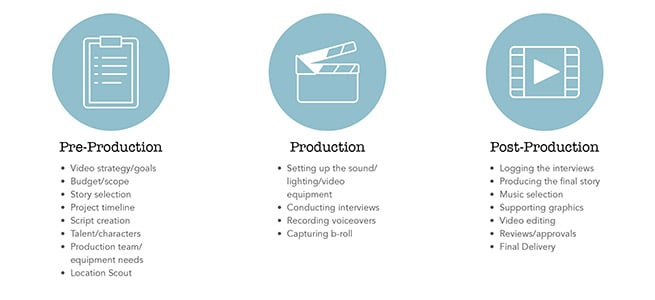Producing Video in 2024? Download Our Editable Video Script Template
This blog was originally published in 2016 and was updated in July 2024. You have brainstormed, planned, and created your budget, but are you ready...
5 min read
 Ed Heil
:
May 02, 2022
Ed Heil
:
May 02, 2022
This blog was updated for accuracy and relevance on July 9, 2024.
Recording videos is easier today than it has ever been, much in part due to the high-quality video cameras built into most cell phones, as well as the accessibility of excellent microphones that hook right into those phones. If you’re inclined to invest in your production resources, DSLR cameras with incredible capabilities have never been more affordable. And to ensure a vivid image, there is simple-to-use lighting gear available online and delivered right to your door. But producing compelling video content, designed to impact a targeted audience, still requires forethought, planning, and an understanding of the video production process from concept to completion.
While the video production process will vary based on the vision and execution of your video, as well as factors such as timeline, and budget, there are some basic building blocks that are constant among successful video producers.

The first step in the process of creating a video is all about preparation and setting the groundwork. During the pre-production phase, it's essential to plan, research, problem-solve, and anticipate any contingencies you may encounter during production. Thorough preparation will help you set your video project up to be successful
The pre-production phase includes:
In order to identify all of these elements, a series of meetings may be needed. Again, this process will vary based on the team and the scope of your project, but here are some basics to help you get started.
Fact Finding: Bring your company stakeholders and video production team together to discuss and understand the purpose, strategy, and goals for your video and how it will be used after it is finalized. If you are planning to work with an external video production company, this is the part of the process where you'll want to communicate things like the branding, tone, and feel of the piece. But before you launch into anything, you will want to identify the target audience for your video, what message you want to deliver to them, and how you want them to feel and react to your video.
Pre-Production Meeting: This meeting is typically held between your video producer and the primary point person for the project. Make sure to set the timeline, identify the characters, finalize the script (if needed), and settle on any location details. This meeting can be done over the phone or in person.
Site Visit (Optional): Depending on the complexity of your plan for filming, it can be helpful to do a site visit to your location, especially if neither the producer or videographer has seen it.
Shoot Preparation: Prior to showing up on-site for your production, your video producer should ensure that scripts have been reviewed and approved, interview questions discussed, characters are vetted, a schedule is finalized and locations are confirmed. All these details will help ensure that the production phase goes smoothly.
The meetings are over; the preparation is complete. Now, it's time to roll the cameras and have some fun! The production phase is where you capture all the interviews and images for your video. This is the part where the story begins to come to life.
The production phase is where all the raw materials for your video will be captured. If you have a specific vision, ideas, or visuals that you want to be included in the final product, be sure that you have clearly communicated that with your producer before the end of the production phase; because once it’s completed, it can be very costly to organize and complete another day of filming.
The production phase includes:
If you are using an external video team, we recommend the primary point person be on location during filming to act as the conduit between the video producer and your brand.
After the production phase is complete, the producer and editor go to work. During the post-production phase, your video production team will begin the process of planning, organizing, and editing the actual video.
The first step involves your producer carefully reviewing all the footage and transcribing all of the interviews conducted during filming. Then, the producer will develop and craft the story before giving the script to the video editor, who will bring all the pieces together.
The production phase includes:
It’s the job of the video production team to manage all the logistics to bring your project to life. In the meantime, you can relax, focus on other tasks, and wait for the magic to happen. This process takes some time and creativity, so don't expect that it will happen overnight.
Every production company will have different timelines for the post-production phase, but you can plan for your project to be completed in approximately 6-8 weeks unless you've discussed another plan with your company
It’s important to note, that if you are looking for a project with a shorter turnaround time, be sure to mention that to your video team at the start of the project. Many companies have the ability to work within your timeline if you make that clear in the planning stage...
Once your video team presents you with a “first cut” or a draft of the video project, that will be time for your project point person and key stakeholders to step back into the mix:
Initial approval and revisions: Once the initial version of the video is edited, it's time to review the work. Assuming there are some changes that need to be made, the revision process can begin. If you are working with a video company, there may be a pre-defined number of revisions or hours set aside for revisions.
Final Delivery: Once the video is finalized and approved, it's time to export the video to its final format. If you are planning to use the video on a specific platform (or platforms) be sure to communicate that with your video team. All platforms (YouTube, Facebook, etc) have slightly different specifications for optimal video playback.
Related Blogs: |
Dependability: Whether you're filming on location, in a studio, at your office, or even at a friend's home, there are a number of moving pieces that need to come together. Does the time and place work for all members of the crew? How about actors or spokespeople? Identifying all of these details is crucial, and it is essential to do it in a logical, systematic fashion.
Predictable Timeline: Video production takes time. For anything more than an iPhone video, you don't just pick up a camera one day and have a video in your hands the next. So, how much planning time do you need before filming and how much editing time is needed afterward? It's only guesswork unless you have a reliable process in place, one that can help you go from an educated guess to a sound expectation.
Accurate Pricing: Most production rates are based on time. The more hours required to plan, film, and edit the project, the more it will cost. And when you add extra days or crew members, that obviously adds to the total time (and price).
Fewer Revisions: When you nail down your objectives, discuss the details in pre-production, and then execute to match your vision, you should have minimal revisions at the end of your project. On the other hand, if you go through the entire project without a solid process, you may end up with issues that require extra editing and time to resolve.
Different production companies and videographers may have different processes, but the bottom line is that process allows video teams to have a predictable pace, dependable results, ensures quality and accountability.
At StoryTeller, our process was modeled after the television newsroom production process. Take a look at how our process differs slightly from the standard process listed above:
While every production company and video project are different, there are some key elements that will help your video project go as smoothly as possible. Whether you are working with your internal video team, or a video production company, make sure that you have an established video production process that helps account for all the different variables of your project.

This blog was originally published in 2016 and was updated in July 2024. You have brainstormed, planned, and created your budget, but are you ready...

This blog post was originally published on August 2, 2022. It was updated and republished on June 18, 2024.

In many households, there’s usually a leader that takes charge to get things done. They’re the one that plans the meals, does the laundry, drives the...